Putin spokesman denies reports that the Kremlin collected 'compromising information' on Donald Trump
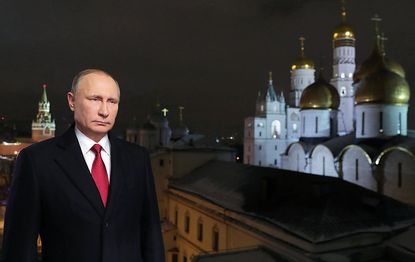

On Monday, Kremlin spokesman Dmitry Peskov dismissed a report from the U.S. intelligence community that asserted Russia tried to sway the U.S. presidential election to Donald Trump, saying the "amateurish" findings are "reminiscent of a witch hunt." On Tuesday, CNN and other news organizations reported that a former British MI6 agent had found evidence that Russia has "compromising personal and financial information" on Trump, and after Trump tweeted that the new allegations were "A TOTAL POLITICAL WITCH HUNT," Peskov said early Wednesday that "the Kremlin has no compromising information on Trump."
"This report does not correspond to reality and is nothing but an absolute fiction," Peskov told reporters. "This is a total bluff, an absolute fabrication, complete nonsense.... The Kremlin does not collect compromising information." Whether or not that's true, technically, neither does the White House; typically, intelligence gathering is done by spy agencies. "The Kremlin might not" collect "kompromat," or compromising information, "but the FSB probably does," notes Politico's Jake Sherman, referring to the Russian successor to the KGB.
Sign up for Today's Best Articles in your inbox
A free daily email with the biggest news stories of the day – and the best features from TheWeek.com
Subscribe to The Week
Escape your echo chamber. Get the facts behind the news, plus analysis from multiple perspectives.

Sign up for The Week's Free Newsletters
From our morning news briefing to a weekly Good News Newsletter, get the best of The Week delivered directly to your inbox.
From our morning news briefing to a weekly Good News Newsletter, get the best of The Week delivered directly to your inbox.
Peter has worked as a news and culture writer and editor at The Week since the site's launch in 2008. He covers politics, world affairs, religion and cultural currents. His journalism career began as a copy editor at a financial newswire and has included editorial positions at The New York Times Magazine, Facts on File, and Oregon State University.
-
 The Week Unwrapped: Will China's 'robot wolves' change wars?
The Week Unwrapped: Will China's 'robot wolves' change wars?Podcast Plus, why are Britain's birds in decline? And are sleeper trains making a comeback?
By The Week Staff Published
-
 The week's best photos
The week's best photosIn Pictures A flower revival, a vibrant carnival, and more
By Anahi Valenzuela, The Week US Published
-
 Drawing the Italian Renaissance: a 'relentlessly impressive' exhibition
Drawing the Italian Renaissance: a 'relentlessly impressive' exhibitionThe Week Recommends Show at the King's Gallery features an 'enormous cache' of works by the likes of Leonardo, Michelangelo and Raphael
By The Week UK Published
-
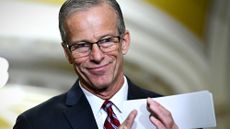 Senate GOP selects Thune, House GOP keeps Johnson
Senate GOP selects Thune, House GOP keeps JohnsonSpeed Read John Thune will replace Mitch McConnell as Senate majority leader, and Mike Johnson will remain House speaker in Congress
By Rafi Schwartz, The Week US Published
-
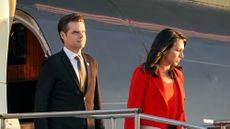 Trump tests GOP loyalty with Gaetz, Gabbard picks
Trump tests GOP loyalty with Gaetz, Gabbard picksSpeed Read He named Matt Gaetz as his pick for attorney general and Tulsi Gabbard as director of national intelligence. Both have little experience in their proposed jurisdictions.
By Peter Weber, The Week US Published
-
 Pentagon Discord leaker gets 15 years in prison
Pentagon Discord leaker gets 15 years in prisonSpeed Read Jack Teixeira, a Massachusetts Air National Guard member, leaked classified military documents
By Peter Weber, The Week US Published
-
 Saudi crown prince slams Israeli 'genocide' in Gaza
Saudi crown prince slams Israeli 'genocide' in GazaSpeed Read Mohammed bin Salman has condemned Israel’s actions
By Peter Weber, The Week US Published
-
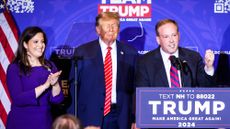 Trump fills key slots, tapping Congress, MAGA loyalists
Trump fills key slots, tapping Congress, MAGA loyalistsSpeed Read The president-elect continues to fill his administration with new foreign policy, environment and immigration roles assigned
By Rafi Schwartz, The Week US Published
-
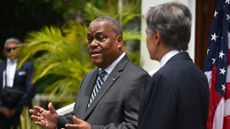 Haiti council fires prime minister, boosting chaos
Haiti council fires prime minister, boosting chaosSpeed Read Prime Minister Garry Conille was replaced with Alix Didier Fils-Aimé
By Peter Weber, The Week US Published
-
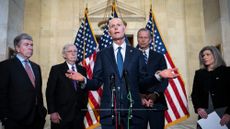 Trump tells next Senate GOP leader to skip confirmations
Trump tells next Senate GOP leader to skip confirmationsSpeed Read The president-elect said the next Senate majority leader must allow him to make recess appointments
By Peter Weber, The Week US Published
-
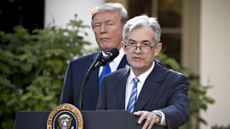 Fed cuts rates, chair says he won't quit if Trump asks
Fed cuts rates, chair says he won't quit if Trump asksSpeed Read Jerome Powell was noncommittal on future rate cuts that were expected before Trump won the election
By Peter Weber, The Week US Published